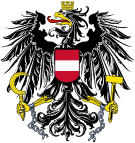2002 Austrian legislative election

| |||||||||||||||||||||||||||||||||||||||||||||||||||||||||||||||||
All 183 seats in the National Council 92 seats needed for a majority | |||||||||||||||||||||||||||||||||||||||||||||||||||||||||||||||||
|---|---|---|---|---|---|---|---|---|---|---|---|---|---|---|---|---|---|---|---|---|---|---|---|---|---|---|---|---|---|---|---|---|---|---|---|---|---|---|---|---|---|---|---|---|---|---|---|---|---|---|---|---|---|---|---|---|---|---|---|---|---|---|---|---|---|
| Turnout | 84.27% ( | ||||||||||||||||||||||||||||||||||||||||||||||||||||||||||||||||
| |||||||||||||||||||||||||||||||||||||||||||||||||||||||||||||||||
| |||||||||||||||||||||||||||||||||||||||||||||||||||||||||||||||||
| This article is part of a series on the |
| Politics of Austria |
|---|
 |
Early parliamentary elections were held in Austria on 24 November 2002,[1] after internal divisions in the Freedom Party of Austria (FPÖ) culminating in the Knittelfeld Putsch led to the resignation of several leading FPÖ members. The Austrian People's Party (ÖVP) emerged as the largest party, winning 79 of the 183 seats, the first time it had been the largest party in the National Council since 1966.[2] It continued its coalition government with the FPÖ, which lost almost two-thirds of its seats.[3] Voter turnout was 84%.[4]
Contesting parties
[edit]The table below lists parties represented in the 21st National Council.
| Name | Ideology | Leader | 1999 result | |||
|---|---|---|---|---|---|---|
| Votes (%) | Seats | |||||
| SPÖ | Social Democratic Party of Austria Sozialdemokratische Partei Österreichs | Social democracy |  Alfred Gusenbauer | 33.2% | 65 / 183 | |
| FPÖ | Freedom Party of Austria Freiheitliche Partei Österreichs | Right-wing populism Euroscepticism |  Herbert Haupt | 26.9% | 52 / 183 | |
| ÖVP | Austrian People's Party Österreichische Volkspartei | Christian democracy |  Wolfgang Schüssel | 26.9% | 52 / 183 | |
| GRÜNE | The Greens Die Grünen | Green politics |  Alexander Van der Bellen | 7.4% | 14 / 183 | |
Results
[edit] | |||||
|---|---|---|---|---|---|
| Party | Votes | % | Seats | +/– | |
| Austrian People's Party | 2,076,833 | 42.30 | 79 | +27 | |
| Social Democratic Party of Austria | 1,792,499 | 36.51 | 69 | +4 | |
| Freedom Party of Austria | 491,328 | 10.01 | 18 | –34 | |
| The Greens | 464,980 | 9.47 | 17 | +3 | |
| Liberal Forum | 48,083 | 0.98 | 0 | 0 | |
| Communist Party of Austria | 27,568 | 0.56 | 0 | 0 | |
| Socialist Left Party | 3,906 | 0.08 | 0 | New | |
| The Democrats | 2,439 | 0.05 | 0 | New | |
| Christian Voters Community | 2,009 | 0.04 | 0 | 0 | |
| Total | 4,909,645 | 100.00 | 183 | 0 | |
| Valid votes | 4,909,645 | 98.54 | |||
| Invalid/blank votes | 72,616 | 1.46 | |||
| Total votes | 4,982,261 | 100.00 | |||
| Registered voters/turnout | 5,912,592 | 84.27 | |||
| Source: Interior Ministry | |||||
Results by state
[edit]| State | ÖVP | SPÖ | FPÖ | Grüne | Others | ||||
|---|---|---|---|---|---|---|---|---|---|
| 42.4 | 45.8 | 6.4 | 4.7 | 0.7 | |||||
| 30.5 | 38.3 | 23.6 | 6.2 | 1.4 | |||||
| 47.8 | 36.8 | 6.9 | 7.2 | 1.3 | |||||
| 42.6 | 37.0 | 10.4 | 8.7 | 1.3 | |||||
| 46.7 | 30.8 | 10.7 | 10.4 | 1.4 | |||||
| 44.6 | 37.0 | 9.6 | 7.0 | 1.8 | |||||
| 51.9 | 24.5 | 10.0 | 11.6 | 2.0 | |||||
| 49.2 | 20.1 | 13.0 | 14.5 | 3.2 | |||||
| 30.7 | 43.8 | 8.0 | 15.1 | 2.4 | |||||
| 42.3 | 36.5 | 10.0 | 9.5 | 1.7 | |||||
| Source: Austrian Interior Ministry | |||||||||
References
[edit]- ^ Dieter Nohlen & Philip Stöver (2010) Elections in Europe: A data handbook, p197 ISBN 978-3-8329-5609-7
- ^ Nohlen & Stöver, pp219-220
- ^ Nohlen & Stöver, p179
- ^ Nohlen & Stöver, p217
External links
[edit] Media related to 2002 Austrian general election at Wikimedia Commons
Media related to 2002 Austrian general election at Wikimedia Commons






